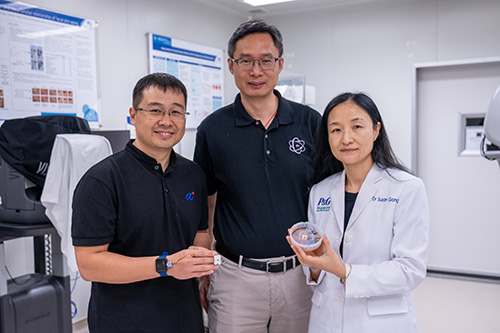P&G, A*STAR and NTU Developed Singapore's First Wearable Sensor for Real-Time Skin Feel Measurement
Professor Chen Xiaodong, President’s Chair in Materials Science and Engineering, has been featured in an interview with Personal Care Insights. The interview highlighted his HapSense technology, developed in collaboration with P&G Singapore Innovation Centre (SgIC) and the Agency for Science, Technology and Research (A*STAR). This interview feature follows the press release in April 2024, which featured the unveiling of HapSense at P&G SgIC’s 10th Anniversary celebration.
|
HapSense – Revolutionising Skincare Industry
This innovative device, shaped like a signet ring and attached to a smartwatch-like module, can analyse the effects of skincare products on human skin up to 10 times faster than conventional methods. It offers a more reliable and reproducible alternative to traditional subjective human panel assessments.
Implications for the Personal Care Industry and Beyond
HapSense has far-reaching potential applications in the personal care industry and beyond. As Professor Chen noted in his interview, HapSense has the potential to:
- Understand consumer-preferred tactile sensory profiles across various demographics
- Track skin changes in response to product treatments
- Recommend personalised skin care regimens
- Improve product formulations in R&D
- Support quality control in manufacturing
What’s Next?
- NTU News Release
- Personal Care Insights, 17 Sep
- Lianhe Zaobao, page 8, 18 Apr
- Lianhe Zaobao, online, 18 Apr
- Singapore Economic Development Board (EDB), 17 Apr
- 8World, 17 Apr
- SG News, 17 Apr
- EurekAlert! (AAAS), 17 Apr
- The Dermatology Digest, 17 Apr
- Mirage News, 17 Apr
- Singapore Business Review, 17 Apr
- The Independent (Singapore), 18 Apr
- Head Topics, 18 Apr
- MSN, 18 Apr








